Donald Trump’s emotional shortcomings and lack of knowledge about the world have forced nations to adopt new strategies for maneuvering around the increasingly erratic U.S. superpower, writes Michael Brenner.
By Michael Brenner
The Trump presidency presents a unique challenge to other governments. Never before in modern times has a major power, much less the world’s paramount power, been led by so erratic and unbalanced an individual. His total lack of experience, knowledge and interest in anything beyond narcissistic self-promotion compounds the problem of figuring out how to deal with him. Understandably – friend, foe and neutral find themselves equally perplexed.
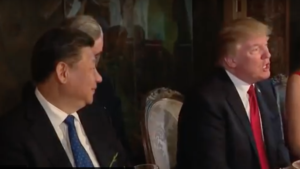
President Donald Trump welcomes Chinese President Xi Jinping to a state dinner during their summit at Mar-a-Lago, Florida, on April 6, 2017, when Trump waited for the chocolate cake dessert to surprise Xi with news that Trump had just launched a missile strike against Syria. (Screen shot from whitehouse.gov)
As they grope for a strategic response, we are beginning to see the vague outlines of three types of approaches. The first is predicated on the proposition that Trump’s mind is vacant – it’s terra incognita to be explored, so let’s try to colonize it. This in effect is the approach taken by Israeli Prime Minister Benjamin Netanyahu and Mohammed bin-Salman (MBS), the Saudi Crown Prince and power behind the throne in Riyadh. Each hurried to Washington, elbowing his way to the head of the queue with the intention of imprinting on Trump’s brain their preferred cognitive map of the world – most especially the Middle East.
The principal features that they worked at etching on his grey matter were these: Israel/Saudi Arabia is your trustworthy ally who is the key to bringing order to the region in a way that will protect the United States. Israel/Saudi Arabia had proven itself trustworthy and dedicated over the decades. We are anchors of stability in an unruly Middle East.
That is why we were offended by the shabby treatment we received from Barack Obama. No gratitude or understanding of our vulnerable position. We are under threat from an aggressive Iran above all. Those diabolical mullahs have mounted campaigns against America as well as us on every front: Syria, Yemen, Iraq, Lebanon, Bahrain, Libya They are surrounding us. Yet, Obama coddled the mullahs. He let them off the hook with that weak nuclear deal and his repeated appeals for dialogue. That’s outright appeasement.
The focal points are nicely chosen. Trump has made a major issue of the “catastrophic” nuclear treaty – threatening to rescind it. He’s tightening the screws on sanctions. Iran is his G-spot on all matters Middle Eastern. It inflames the nerve ends still quivering from the recurrent stimulation of terrorism. Linking the two has been recurrent method for playing on the taut strings of the American body politic.
For the Israelis and Saudis, this point of concentration provides a beachhead onto the Trumpian mind that can flare out to other sensitive spots already identified: Russia, unleashing the American military to conform to his chest-thumping rhetoric – e.g. the Tomahawk attacks in Syria, and feeding the national appetite for violent action. The fact that Jerusalem and Riyadh are working in tandem these days adds a nice synergistic touch to the campaign.
The Marx Brothers Syndrome
A second approach toward dealing with Trump emphasizes nimbleness and improvisation. Its point of departure is that there is no way of knowing what will emanate from the White House since Trump himself doesn’t know. Its inner workings evoke images of the Marx Brothers in A Night At The Opera.
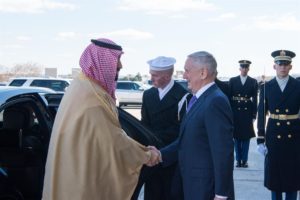
Defense Secretary Jim Mattis welcomes Saudi Deputy Crown Prince and Defense Minister Mohammed bin Salman to the Pentagon, March 16, 2017. (DoD photo by Sgt. Amber I. Smith)
Coping strategies for managing in an environment of high uncertainty come down to three options. One is to disengage. Since I can’t figure out what is happening, and certainly have no idea as to what might happen tomorrow, avoidance is the safest course of non-action. Of course, some governments will find that easier than others.
Vanuatu, Lesotho and most other tiny nations are essentially bystanders to world events. Control over their own fate is minimal in the best of times. So, their diplomats can just chill out – amuse themselves perusing The New York Times’ funny pages while sipping a cappuccino. Some others don’t have that luxury and/or will not admit to themselves that functionally they are little different from the micro-states. Western Europeans and Japan fall into this category.
In theory, they could follow the other two methods for dealing with their Trump predicament whose hallmark are tumult and uncertainty. Increase your ability to foresee by acquiring better access to information OR process more effectively the information you have. The former is precluded by the mental vacuity noted earlier. The latter is liable to result in the stripping of mental gears as the intellectual machine cannot operate without lubricating oil and the nourishment of information.
The last alternative is to gain more leverage over policy-making in Washington. However, it is unrealistic to attempt an imitation of the Israelis or Saudis. No other governments have the access, the status or the tools to insert themselves into the turbid world of Trump and his White House. In truth, they don’t have the audacity either.
The situation of the Europeans is complicated by the awkwardness of having to maneuver simultaneously as national governments and as participants in the institutional mechanism of the European Union. The E.U. is both an opportunity to augment power through concertation and a readily available device for avoiding taking risky actions. The latter invariably prevails in relations with the overweening United States.
The Europeans do a few things extremely well: talking and holding meetings. The instinctive, habitual response to crisis or challenge is to add to the already weighty meeting schedule and to form task forces. In these activities, they surpass even the practices of American universities – no small feat.
As one Old World cynic has wearily opined: “the Americans fight pointless wars; we hold pointless meetings. Who’s the wiser?”
Tiptoeing Carefully
Consequently, European governments (and likewise Japan for some similar and some different reasons) have been largely inert in front of the Trump dilemma. British Prime Minister Theresa May did dash to Washington (actually beating out both Netanyahu and MBS) to ingratiate herself with the new jefe in the White House. Her keenness to declare herself the leading member of the groupie gang was animated by the fanciful idea that the U.S. somehow could save her and Britain from the full consequences of the Brexit folly. Other European leaders held back until they could summon the courage to come within reach of his grasp and expect to return safely home.
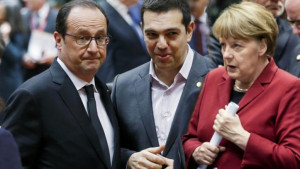
Greek Prime Minister Alexis Tsipras (center) with French President Francois Hollande (left) and German Chancellor Angela Merkel (right).
The particularities of the fraught issues at the top of everyone’s crisis list have been an additional inhibiting factor. In the Middle East, all the allies have signed on to the American formulation of the Syrian war – and its foundation stone: currying favor with the Saudis and Israel. They have joined Washington, with varying degrees of enthusiasm and conviction, in stigmatizing the Assad regime as the source of all that has befallen the country. They have called for his ouster as the sine qua non for moving toward a resolution, they refrain from uttering a word of criticism at Turkey (which at any moment can reopen the refugee flood gates), Saudi Arabia and Qatar for their crucial backing of ISIS and of Al Qaeda in Syria (whose very existence they deny in echoing the American line) and express an aversion to engaging earnestly with the Russians in the search for a way out.
Trump’s sudden acknowledgement that Assad was likely to stay in Damascus was reversed so quickly as to spare them the headache of agreeing, disagreeing or explaining. Indeed, nearly the entire European political class is emulating its American counterparts in ignoring the cardinal truth about Syria: either Assad stays around or the jihadis will rule Syria.
Surpassing even Syria as a combustible problem, and with grave implications, is Ukraine. Here, there were discernible differences between the major Western European powers and the U.S. While condemnation of Vladimir Putin’s annexation of Crimea was shared, Germany’s Angela Merkel and France’s Francois Hollande were equivocal about moving toward a confrontation with Russia. (Even more uneasy was Premier Matteo Renzi of Italy). They dragged their heels over full-spectrum sanctions, and lent mainly silent support to the NATO build-up that brought Western forces to the Russian border.
Most important, the pair took the initiative in brokering the Minsk I and Minsk II accords that sought to lay the basis for a Russo-Ukrainian peaceful freezing of the crisis. It has been the Petro Poroshenko government in Kiev that has stymied the plan by its failure to meet any of the main conditions regarding: constitutional changes, disengagement of troops, and planned referenda. The Obama administration refusal to pressure Kiev emboldened Poroshenko who anyway has been under enormous pressure from the ultra-nationalists who hold his fragile government hostage.
Merkel and Hollande issued a few tame words of concern and then abandoned the diplomatic field to Washington. They also began to echo the American denouncement of Putin as a reckless adventurer and threat to continental peace.
When Trump shifted the rhetoric regarding both the man and the country, neither jumped in to second him or to encourage him. Hence, as his administration has moved the U.S. back into a more hostile position, they have kept the same low profile. Of course, there were other factors in the equation: elections were on tap in both countries, the immigration crisis sucked up all the political oxygen, and terrorism had taken over the headlines. Hollande soon was on the way to oblivion, and Merkel vulnerable.
Turkey’s Own Wild Card
As for the Turks, they are on their own, irregular course. President Recep Tayyip Erdogan is as erratic and feckless as Trump. He does know what he wants – but he can’t get there without squaring circles and fitting square pegs into round holes. Hence, tactics are constantly changing.
The Sultan’s ambition has been to create a facsimile of the Ottoman Empire in the Middle East. That means grabbing the northern part of Syria along with Mosul in Iraq while being acknowledged as the Guide by the Sunni Arabs. Toward that fantastic end, he has encouraged and succored the Takfiris: both ISIS and al-Qaeda/al-Nusra & Assoc. They could not have organized and sustained themselves as they have without crucial Turkish support on Turkish territory. The parlous scheme totally unraveled when the Russians entered the fray.
Erdogan still wants to be the power broker in post-war Syria. And above all, he is desperate to block the Kurds’ move to dominate the Syrian-Turkish borderlands. A weakening hand means that he constantly comes up with new maneuvers – trying to play all parties. To date, his greatest accomplishment is to alienate just about everyone and to isolate Turkey. What does that imply for Erdogan’s approach toward Trump?
Erdogan gives the impression of being so puzzled by Trump that he has given up any effort to discern the White House’s plans or to anticipate its actions. Anyway, so wrapped is he in his own convoluted strategizing that he finds it hard, if not unnatural, to take the bearings of another statesman – even a sober one. That is evident in his erratic dealings with Putin, the Iranians, the Saudis, and the ISIS leadership who are now as much threat as surrogate.
In other words, an implicit abstention from clever machinations aimed at influencing Trump’s attitudes. Instead, he will press ahead with his own initiatives regardless – even if that risks conflict with Washington over the aggressive role of the YPG Kurds around Raqqa.
A Clash of Egomania
What will happen when these two ego-maniacal, impulsive men encounter each other next Tuesday in Washington? Will Erdogan insult Trump with charges that the CIA was behind last year’s abortive coup? Will he insist that the U.S. hand over Fethullah Gülen – or else? Does he hope to force a trade of curbing the Kurds in exchange for continued access to Incirlik airbase?
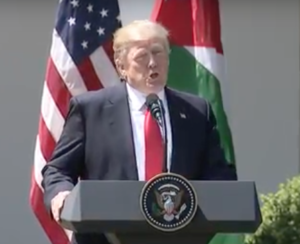
President Trump at a news conference with Jordan’s King Abdullah II on April 5, 2017, at which the President commented on crisis in Syria. (Screen shot from whitehouse.gov)
How will Trump react? Will he back off this past week’s pledge to arm the Kurds in the teeth of Erdogan’s denunciations? Will he silently accept humiliation as Defense Secretary (retired General) James Mattis did a few weeks ago in Ankara in the face of a Turkish harangue – or throw a tantrum? If a tantrum, will it come during or after the meeting?
More likely, they will reach a quiet understanding whereby the Americans pledge to rein in the Kurds once ISIS is disposed of. Such an arrangement would not trouble the Iraqi Kurdistan Region whose President, Masoud Barzani, heads the Kurdistan Democratic Party (PDP) which has a long-standing rivalry with the PKK/YPG. Moreover, Barzani profits from a commercial partnership with Turkey that provides an economic lifeline for the landlocked region. As for Turkish sponsorship of the Takfiris other than ISIS, it will continue. Washington will continue to find it convenient to ignore since these selfsame groups have been America’s own tacit allies. In a dialogue of the blind and the deaf, it matters nothing that Erdogan and Trump speak the same unintelligible language.
The Third Alternative
Brain sculpting a la Jerusalem and Riyadh is a restricted patent. Passivity is not viable for countries that have big stakes in the global order and a combination of means and ambition to take an interest in shaping it. That means Russia and China. They have had to find a different way.
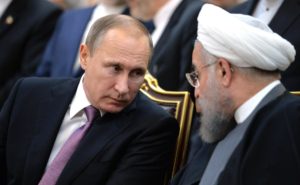
Iranian President Hassan Rouhani meets with Russian President Vladimir Putin on Nov. 23, 2015 Tehran. (Photo from: http://en.kremlin.ru)
Moscow harbored hopes that Trump would deviate from the course of implacable hostility followed by Obama and marked out by Hillary, too. Given her brutal language, including a direct comparison of Putin to Hitler, Russia had good reason to prefer the alternative. Too realistic to reach the facile judgment that Trump had actually thought through alternative policies and had chosen the wiser course, they did interpret the consistency of his words as inclining toward accommodation and pragmatic cooperation. Putin’s likely hope was that a pattern of business-like dialogue could be opened, grounded on the principles of: a recognition of Russia’s legitimate concerns (in Europe) and its interests (in the Middle East); an appreciation that Moscow and Washington had convergent interests in countering Islamic terrorism and in the stabilization of world energy markets; and a sober restraint in pressing a values agenda that had proven dangerously destabilizing.
A multilateral diplomacy guided by that sort of low-key realism long has been Putin’s goal. He has articulated it on multiple occasions with rare candor and specificity. Washington, and Western leaders generally, seem never to have paid it any attention – assuming that they have read them.
The White House’s newfound tack in the direction of antagonism and confrontation creates a quandary for Moscow. They will not yield – as demanded by Secretary of State Rex Tillerson and Trump’s phalanx of generals – or bow to American suzerainty. Instead, they will hold fast, temporize, make practical proposals such as the no-conflict zones in Syria – and keep their fingers crossed that Trump is not pushed into doing something fatally stupid.
In the longer run, there is always the possibility that the political winds whistling through the desolate open spaces of Trump’s mind might uncover a small oasis of sanity in the mental wilderness, and clarify a vision of the world that permits the sort of engagement they’d prefer.
China’s Long View
China is in analogous position – with some cardinal differences. For one, there are no ominous flashpoints where friction between the two powers runs the risk of leading to open conflict. No counterpart of Ukraine; no proxy fights as in Syria. Disputes over the contested, energy-rich isles in the South China Sea may raise blood pressure, may stir the planners to game great air-sea battles a la WW II, may prompt the New York Times to publish half-a-dozen stories a week highlighting China’s alleged deep-seated problems (a classic case of projection cum sublimation). But no one is going to war in the nuclear age over spits of sand.

The aircraft carrier USS Carl Vinson travels in the South China Sea, April 8, 2017. The Carl Vinson Carrier Strike Group is on a regularly scheduled Western Pacific deployment. (Navy photo by Petty Officer 3rd Class Matt Brown)
Moreover, Washington and Beijing share a genuine worry about North Korea. Each recognizes that it must coordinate with the other in order to neutralize the danger. As for Taiwan, Trump’s misstep was quickly corrected when Beijing coolly reminded him that such a thing as history exists and that he does not operate in a world environment that accommodates his unbridled exercise of free will.
In the economic realm, the logic of interdependence is overwhelming. Commercial cum financial wars would ruin both countries. China’s possession of $1.5 trillion in U.S. Treasury notes and America’s vast market for Chinese goods creates the economic parallel to a condition of Mutual Assured Destruction. In addressing specific, nettlesome issues like the Trump charge of Chinese currency manipulation or restrictions on American companies in China, Xi et al will prove as tough yet calculating as any businessman Trump or his Goldman Sachs advisers have met.
The Chinese have the advantages of knowing exactly what they want, the confidence that they will reach their objectives, and the savviness to play the game. Above all, they know that time is on their side – so patience is in order.
Moreover, the Chinese leaders are dexterous. That was evident at Xi’s meeting with Trump in Florida. Unlike many others (in the U.S. and abroad), the Chinese seem to have understood that Trump was an empty-headed ignoramus. His bombast was taken as a sign of immaturity. So, too, was his party trick of employing a chocolate cake to highlight the Tomahawk attack. They are aware that he is allergic to hard thinking. They know that his narcissistic ego prevents him from relying on truly able people to whom he might cede authority. To them, he is the quintessential barbarian – the kind of barbarian they’ve been handling for more than 2,000 years. A Yi with nuclear weapons.
They will play in and on his mind. Not in the blunt manner of Netanyahu and MBS. Their approach will be subtler. Honor him by sharing things that a man of his strength and power should know: e.g. Korean history a la Chinoise. Humor him but don’t defer to him. Habituate him to the mores of mutual respect. Don’t make threats, or even issue prophecies; rather nudge him toward the apprehension of wisdom that he believes is his own revelation. Massage his dispositions and inclinations rather than instruct – knowing all along who will earn the Mandate of Heaven. For Trump marks the ordained descent of the United States.
Michael Brenner is a professor of international affairs at the University of Pittsburgh. mbren@pitt.edu

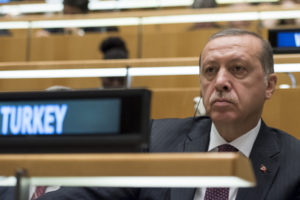
Dean: I can’t just sit here, Bobby, I have got to help him.
Bobby: Dean…
Dean: Dreamscape his noggin, something.
Bobby: You know what Cas did. The dam inside your brother’s head is gone, and all hell’s spilling loose. We don’t know what’s going on inside there.
Dean: I don’t care.
Soulless Sam: My God. Am I really that gawky?
Sam: This is impossible.
The Man Who Knew Too Much
It’s impossible, it’s the mission.
Sam: Hey. HEY!
Tortured Sam: Oh, hi Sam.
Sam: So. Which one are you?
Tortured Sam: Don’t you know? (stands up to show his face, which is harrowed.) I’m the one that remembers Hell.
Remember, in espionage, every deal is a deal with the Devil. Trumps torture backfired.
Man without a face: What the f— is going on here?
Small group of onlookers: We thought you would know?
Man with no face: You think I’m stupid??
Everybody: Nobody knows……….
While I agree with the author about Trump’s “total lack of experience, knowledge…” – I have to disagree slightly with “Never before in modern times has a major power, much less the world’s paramount power, been led by….” I recall that Ronald Reagan, a third tier Hollywood star, suffered from Alzheimers throughout years of his presidency, to the point where Nancy, standing very close to him, had to whisper his lines to him, and foreign heads of state, after meeting with him, were left speechless, looking confused and scratching their heads. And then, of course, there was George W. Bush who, if Daddy’s great generosity and political pull hadn’t paid his way through Ivy League schools, and if he had been an average American, would have ended up in a Special Ed class in our not very demanding public school system. His stupidity was legendary, and many books of his actual quotes, some of them mind-boggling, were published. I still have one of them. While each one of the three is in a category of his own, the “Never before in modern times” is not exactly accurate.
Thanks Helga. Kinda puts things in perspective.
Fifty years ago my old undergraduate research mentor had a saying to explain how university administrators are chosen: “The shit floats to the top,” he’d say. That piece of wisdom had been passed on to him by his research mentor a generation earlier. Now I share it with you and suggest that it also applies to the highest of government offices.
Dead on. In my lifetime we have had several dunderheads for Prez – these 3 3 lead the class.
While I agree, I feel there is something distinct about what this presidency represents. The last sentence of the article is worth repeating, “For Trump marks the ordained descent of the United States.” That the Democrats colluded for a candidate who could not beat this guy also marks this descent. Yes, I am aware of all the arguments for how the Republicans stole the election just to anticipate counter comments. So maybe I should say “…who could not so easily beat this guy that a certain amount of shady gamesmanship on the part of Republicans would not tip the scales.”
Feb 26, 2017 NATO-CFR Allies Pence and Mattis Subvert Trump on Russia
He discusses Russia’s paying the last Soviet Union debts, the Pentagon-Russian Ministry of Defense war of words, U.S. Vice President Michael Pence’s speech at the 2017 Munich Security Conference, the sudden death of the Russian ambassador to the U.N., Vitaly Churkin, and new Russian weapons and military technologies.
https://youtu.be/qygsOlGJViU
May 7, 2017 It Wasn’t Russia, How Erdogan Bought Trump and His Neocon Gangsters, the Kosher Nostra
Learn who Mike Flynn and Rudy Giuliani really work for and why they are stabbing America in the back while Trump smiles
http://www.veteranstoday.com/2017/05/07/it-wasnt-russia-how-erdogan-bought-trump-and-his-neocon-gangsters-the-kosher-nostra/
I’ve only started to read this news source several days ago. This article is both insightful and accurate, and also funny albeit serious, not exactly funny / haha but funny yikes. The author has Trump nailed, not to a cross but to a burning dumpster. Unfortunately at this point, America deserves Trump. The rest of the world does not. And I think his last thoughts are accurate: Trump signals the final descent of America into egregious genocidal madness, where we’ve been heading a long time now under the previous many genocidal maniacal presidents soiling the Oval Office (or is it Oval Orifice?).
It’s also called the Offal Office.
Agreed that Donald Trump is a complete naif when it comes to US government foreign policy… or operating within the world of politics in general. But how does it make the situation the slightest bit better when he is being assailed from all sides within his own country, let alone foreign influences? How can he focus on what is true and what is necessary when actors within the Deep State, within the Democratic opposition, within his own party, and throughout the corporate media are out to embarrass and sabotage his every move? There is absolutely nothing he can say or do that will not receive scorched earth condemnation by a majority of commentators within our own society. There was no “honeymoon” given to him by anyone other than Melania, and that was over a dozen years ago. It was nothing but one attempt at a soft coup after another as soon as Hillary’s concession speech was broadcast over the media. If the idea is to preserve Western “values,” the human race and most of the biosphere rather than see it vaporised in a nuclear fireball, the man could have used plenty of support and good advice, both from his own side of the aisle and (heaven forbid!) from the “loyal opposition.” Ninety-five year old Henry Kissinger seems to be the only Republican party “elder” who volunteered to give the man useful advice and support. Everyone else simply demonizes the man without restraint, as they do Putin. This American proclivity to eat our own is a losing strategy in my opinion. Of utmost relevance is that the media, now basically a monopoly controlled by five mega-corporations all in collusion, has totally lost all objectivity and exists only to push the same warmongering agenda favored by the Deep State and the establishment power centers. Even David Berstein, who in his younger days spoke truth to power, is now in the business of mouthing nothing but propaganda in the service of the power structure. Sorry, David, but there is nothing similar or parallel to Watergate or Richard Nixon in the presently confected conspiracy to overthrow Trump, and what’s worse is you KNOW that.
For those who are sure to twist my words, I have let it be known many times that I am not a supporter of most of Trump’s stated agenda–at least not what he outlined during the campaign, especially on the domestic side. The point is I didn’t like the “hunting of the president” when they did it to Bill Clinton during the 90’s, and I’ve come to like it even less when what used to be “my side” has adopted the same tactics. This McCarthyist bullshit was reprehensible in the 50’s when the Republicans did it and it is no more acceptable today just because Hillary and the Democrats are doing it. I’ll clue you in, Democrats, this crap you are trying to pull will only LOSE you more support, not gain any. Get a clue, Nancy Pelosi and Chuck Schumer, and start viewing what people are saying on You Tube. You might have your staff review a few videos of the Jimmy Dore show. Those people WERE your base. I don’t know who’s left to you now. Perhaps Likud.
Well said, Realist. I think we’re witnessing the downfall of both R and D parties: the Rs for their agenda of domestic policies, that people who vote for them are finally realizing is pure poison (Trump is no part of this Establishment, probably doesn’t know what he signs on to), and the Ds for their agenda of foreign policies of permanent war and attempting to break the other Great Powers(Russia and China) in the World (which Trump, with his simple businessman’s sense, sees the obvious advantages of WORKING WITH them, and is struck dumb by the raging hostility to this policy). R and D are not long for this World’s political stage. China’s New Silk Road policy will FORCE a change in our Establishment, and a “civil war” of sorts within it, and its’ Deep State apparatus…the promise of certain and GREAT wealth lying along the New Silk Road will be too hard to ignore.
Good post Realist. I agree that over the top Trump bashing (and I have done some myself) is counterproductive. With the dangerous witch hunt that is in progress, maybe some selective support for his deeply flawed presidency makes sense. After all, no one can really know whether Pence might be even worse.
Hi Mike. Google “Pence and Dominionism”. Pence might be a Dominionist, these are like Christian fascists, who eschew the Constitution and its secular separation of Church and State (a hard lesson learned in the 30 Years War; 1618-1648). I just remind myself with a little jingle I made up: “All hail President Pence. Let Armageddon now commence”. These fundamentalist folks forget THAT part of the Bible where Jesus said: “My Father’s Kingdom is not of this World”…what all Mystics actually say. There will be no bribing “King Jesus” to return to this World by initiating a World conflagration…a grave mortal sin, reminding me of another Quote: “Be gone from Me. I never knew you”.
In general, I agree. But I don’t think that everything Trump does is attacked. I found it very scary to see how Trump was heaped with praise after the Tomahawk missile attacks against the Syrian army and the first use of the largest non-nuclear bomb in Afghanistan. He was called “presidential” by the very media and politicians who usually only utter scathing condemnation of everything Trump does. The suggestions that there should be more such attacks in Syria and Hillary Clinton’s extremely irresponsible suggestion that such attacks should be made without warning Russians beforehand were brought forward in a relatively friendly way. So, even though the very harsh criticisms concern almost everything Trump does (in some cases I think it is justified, in others less), he has clearly been shown that there is mainly one issue that decides about whether he is accepted by the elite – to what degree he is ready to align with a belligerent foreign policy agenda. If he goes along with the regime change wars of the Project for a New American Century, he is treated as a worthy, albeit somewhat strange president, but when there is the fear that he will not pursue this war agenda diligently enough, he is a racist and homophobic dictator, a Russian puppet, and a threat to American democracy. This seems to be an attempt to apply reinforcement learning to Donald Trump. It even seems that Trump’s erratic behavior, which leads him not always to pursue the path of least resistance may be a reason for faint hope in the area of foreign policy.
Yes, Trump’s tomahawking of Syria was one of the few instances in which he actually gained approval from the Neocons, the media, the Dems and the Deep State, suggesting to me that it was an action meant to appease them. It only kept them off his back for a very short time. Since most of his enemies hated Comey too (for sabotaging Hillary’s campaign), perhaps he misjudged their response. Perhaps he thought they would not be critical. But they are too hypocritical to let such an opportunity to pass without condemnation.
Good analysis, and the build up to a crescendo from the way the tiniest states react, via the sycophantic ME duo, the spoiled brat, through the passivity of the bigger Western European states & the EU, to Russia as a long time global (chess) player but still walking a tight rope with Trump, to the new global player which can truly match Trump and trump him without either him or his generals & minions around him even realising what is going on until it is too late. If any country it will be China that will make Trump and/or the US face their true Waterloo.
nice article
Another thought provoking article that you won’t read in the MSM.
I am not convinced however that the Mandate of Heaven has full control of the situation. The provincial and county authorities in China chart their own course and care nothing for the public debt they incur, as skimming is the name of the game.
The insane hubris of Empire and the reckless behaviors it induces are not so easily quelled. Remember this is not all about Trump, although this article focuses on him. The deep state is a reality that will continue to wreak it’s crazy designs, regardless of who is in the Whitehouse. And it’s not just the neocons either, we have to factor in the brainwashed, ignorant American public – besotted with money consciousness and stupid enough to elect a fool like Trump. It’s not just Trump that is crazy and unpredictable – it’s America. Our karma is deep and vast, our crimes reek to high heaven. Does anybody really think Donald Trump is responsible for all of this deadly history. Did he decide to pursue nuclear armament to the max, and refuse to negotiate? Did he torpedo every climate conference? Trump is actually a minor player in this long running tragic affair called American history.
Well said Mike, I was going to write something along the same lines, but you have saved me the trouble. However, Brenner seems to imply from his piece that George Bush was sane! The horror that Bush has inflicted on the world has yet to be out done by Trump, But as you rightly point out, its who pulls the strings that makes the puppet dance that really counts.
Stupid enough to elect a fool like Trump? That can only be evaluated in terms of the alternatives.
Trump is a result of an even bigger American problem, and that problem is the American voter gets no choice other than for them voting for the lessor of the two evils. Trump may have been on to something when he said, ‘the system is rigged’, and even though Trump is part of that problem he is right…it is rigged. The media’s marginalization of all alternative candidates works well to keep the two parties who act like one viable is an even bigger example of the rigged system. I don’t think there are many American voters who would not wish they had an alternative, it’s just how to do it is the problem. The whole system is rigged, and there are no signs that it will change any time to soon.
It appears that Russia and China may be the only adults on the world stage.
Agreed. This might be the most succinct analysis I have read.
I would feel sorry for our country and in some ways I do, but it is tempered by knowing that the fault is ours. We engage the world from a place of arrogance and self belief of superiority. And resultingly seem only to destroy and kill, enrich the rich while impoverishing the poor.
And now we have sunk to being lead by a cartoonish buffoon, a flim flam man. No good will come of it for anyone.
Yes, because we are tired of being adults. Do you know how hard it is to be an adult? I’d rather be trump on a merry-go- round- than be an adult, because adulating is hard. I love not being an adult, and I am 53
Towards the end where Professor Brenner states how the Chinese will, ‘nudge him toward the apprehension of wisdom that he believes is his own revelation’, is something we all talked about on this comment board a while back. I myself said, how I knew business executives who created an art out of this type of persuasion, where you make suggestions in such a way as then the boss believes your idea is his idea.
Now that Moon Jae-in won the presidential election in S Korea it would seem fitting that America and China lay back and allow Jae-in to work his magic with Kim Jung-un. If S Korea doesn’t want THAAD missiles on their land, then remove them. The U.S. has to learn to let sovereign nations be sovereign nations, and deal with the outcomes as they come…oh, and do this peacefully. The world is tired of war, and the world is even more tired of America’s Military Industrial Complex.
Right Jo, but don’t forget the American tax payer who is being milked to death to feed the voracious appetite of the this monster in their country called the industrial military complex.
John thanks for bringing this subject up, and yes I always regret how badly our government has financed our American infrastructure. When I look at the National Debt and consider how most of that debt has been structured around war it leaves me weak just thinking about it. This debt looms over the American publics head while at the same time healthcare recipients, as retirees, struggle to keep their heads above water. Many more others drown in this ocean of misappropriated tax dollars when all the while our government continues to destroy what isn’t ours to destroy.
The South Koreans wanted to throw the American garrisons out of their country back in the 80’s, just as Marcos of the Philippines actually did to the super power at that time. Many if not most Japanese would do the same, especially in Okinawa. We only make them targets for our self-serving hegemonic purposes. We destroy their environment, rape their women, and flout their laws just so we can claim their turf as part of our empire. We can project our nuclear deterrence planet-wide without having to garrison tens of thousands of GI’s on their property, and if the Chinese WERE to invade any of those countries by land, we could NOT stop them and would have to evacuate. All those American bases are simply the symbolic equivalent of a hound dog that pisses on every major object he passes to pronounce his presence and importance to the other dogs.
Realist this hegemony you speak too, is what I saw as our country’s being very hypocritical in our actions when long ago I served in our U.S. Navy. All the ‘freedom’ and ‘liberty’ rhetoric that was thrown around disappears once you are there in these foreign lands, and you see who, what, where, our American interest are in support of. It’s all one big lie to be told over and over again, as the jets fly over the opening of the Super Bowl, and the crowd raises their fist with a macho loud ‘hoorah’. We are talking some sick bs being tossed around in our nation of do gooders while the rest of the world grows more and more towards hating our American guts for what we do to them. The sadder part is, is that the old lady next door, and the teenager down the street from you in our American suburbs has no idea of how any of this works. Thank you Main Stream Media for jerking our American citizen chain, and have fun with all your money….you creeps.
Joe , I like your attitude, always positive, always peaceful. I do feel the same . Reality cuts in with my feelings, just like you, I tend to
believe in world peace, The world tends more to power and money. I am not so hopeless, because, there are so many of us. Placards and signs will not effect change, voting will. Get those people in your neighborhood out, talk to them, we cannot lament the situation. If you can , watch the movie ,”Get Out”
Funny you should bring up urging me to vote tina, because just last Friday I swore I would never vote again. So your comment is appreciated as a ‘sign’ if I accept your suggestion. Our family does donate, as we have done leaflets along with going door to door, and we all vote….but tina I’m beginning to think we should do massive boycotts to have societal impact….hit Wall St. in the wallet.
I am peaceful, but I still would have a defensive military to guard our shores, but that’s where it ends. George Washington warned against foreign entanglements, yet instead our current foreign policy is based upon starting foreign entanglements…and staying the course – hoorah! The Russians are right, we should all disarm convential and nuclear by 2045. What’s wrong with talking about something so important as saving all of humanity? There, tell that to your resident Neocon lover. Besides Raytheon would have plenty of time to retool and divest it’s core nuclear bomb building…how about ecology geared projects?
If these head up their asses corporately owned DC bill pushers had any decent thought in their empty egotistical heads they would at least do all mankind, and their grandchildren a favor to do something right, and take Russia up on this offer to cut back on war & war weapons. This kind of diplomacy is ripe for the world in it’s current state, and the U.S. must come to change it’s foreign policy immediately.
Lastly last week tina you wrote a couple of funny comments, and I joked in my head how I wondered if your last name was Fey, and how we my wife, son and I, love watching 30 Rock….your not, right? No matter thanks for the nice reply, and yes tina – PEACE! Joe